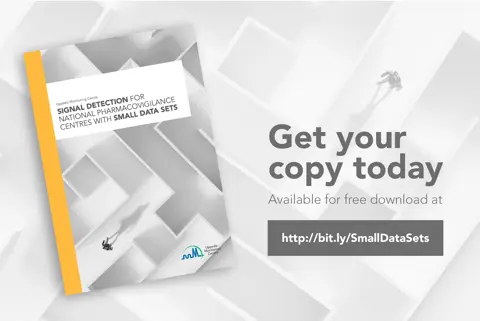
Gerard Ross
Head of Global Communications, UMC

Data is the currency of science, and researchers always want more. But it’s a mistake to think that huge data sets are a prerequisite to effective pharmacovigilance. In fact, in their quest for improved patient safety, national pharmacovigilance centres are able to perform significant signal detection work, even with relatively small data sets.
A new handbook by UMC is now available to help pharmacovigilance professionals make the most of the data available to them.
Signal Detection for National Pharmacovigilance Centres with Small Data Sets is a free publication that sets out to provide concise, structured guidance for signal management, primarily in national centres with small databases and limited resources.
For many national centres, the number of individual case safety reports (ICSRs) is relatively small, and the range of medicinal products and the event profiles may be unique to each location.

“The challenge for staff in these centres is to employ a structured manual method to process available data and to reliably discover potential safety issues"”
To address that problem, the guidebook provides a clear, 10 step process primarily focused on qualitative signal detection methods, describing a workflow that takes pharmacovigilance professionals all the way from identifying potential signals, through case building, analysis and evaluation, actions, and communication.

Egypt's swift detection of vincristine-associated necrotising infections demonstrates how effective pharmacovigilance can identify risks and protect patients globally.
08 May 2025
South Africa’s pharmacovigilance system has been evolving for over a decade with UMC’s data management system supporting them every step of the way.
02 September 2024
Disproportionality analysis is pharmacovigilance’s signal-detection workhorse. But more reports do not mean better evidence, and crude results can mislead.
05 February 2026